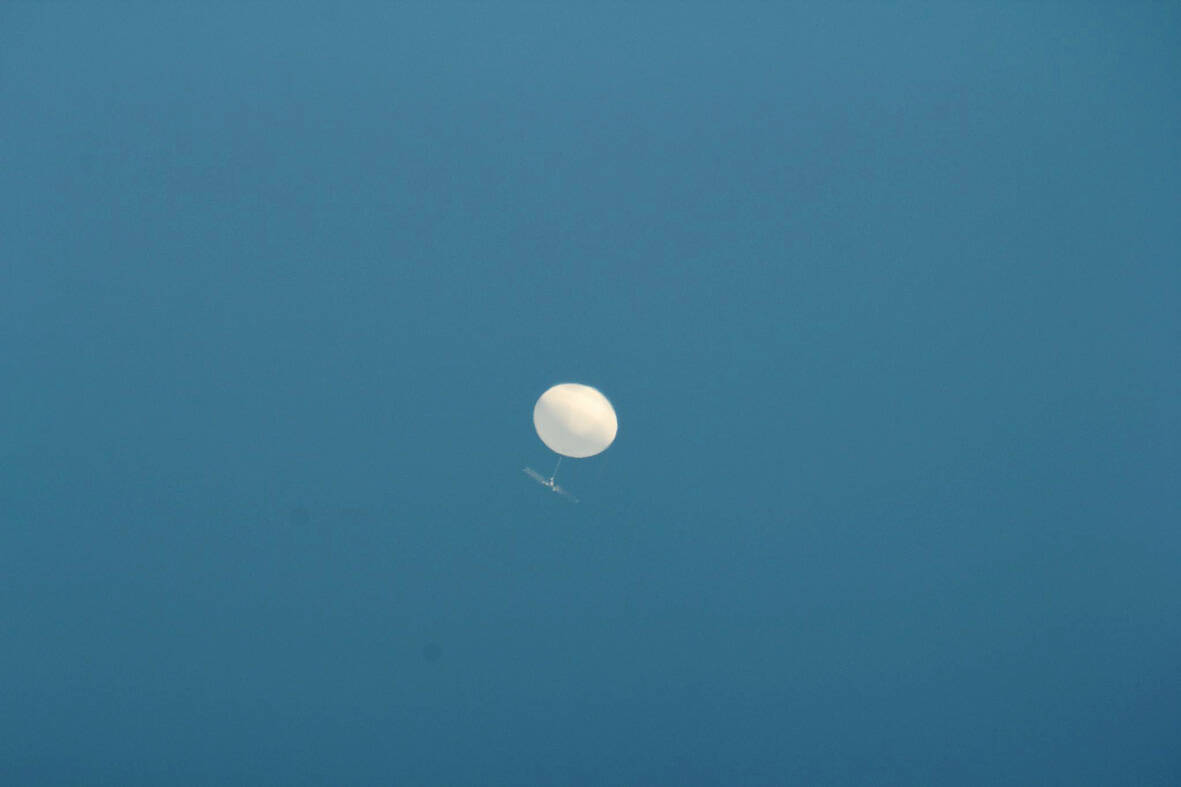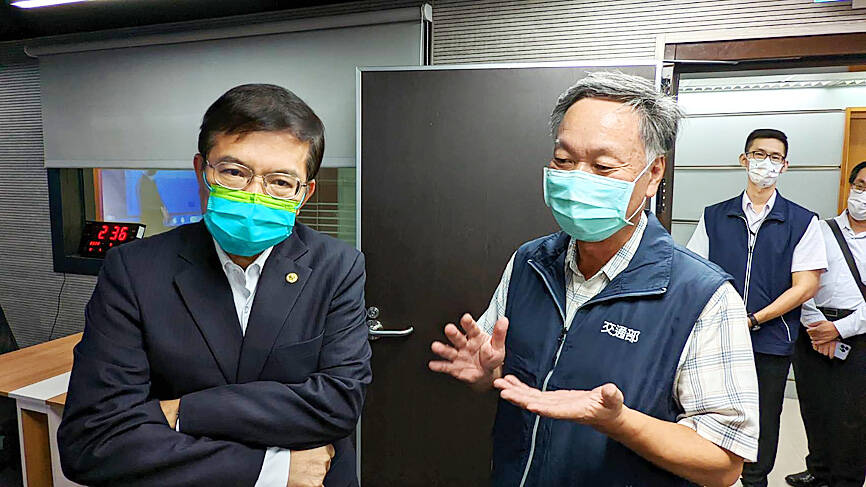A suspected Chinese surveillance balloon flying over the US was yesterday condemned by officials in Taipei and sparked calls for the government to plan countermeasures.
The Pentagon on Thursday said it had detected a Chinese surveillance balloon flying over the country.
Beijing has said the balloon is a civilian meteorological device that drifted into US territory after being blown off course.

Photo courtesy of the Central Weather Bureau
The National Security Bureau and Ministry of National Defense should investigate whether surveillance balloons could be used against Taiwan and prepare to respond to such acts, Chinese Nationalist Party (KMT) Legislator Johnny Chiang (江啟臣) said.
US Secretary of State Antony Blinken’s postponement of his visit to China as a result of the incident was a foreseeable consequence arising from the competition for power between the two countries, he added.
The Ministry of Foreign Affairs condemned China in a statement, saying that Beijing’s behavior breached international laws and was “unacceptable to the community of civilized nations.”

Photo: Cheng Wei-chi, Taipei Times
China should cease all activities that infringe on the sovereignty of other nations or cause instability in the region, it said.
Premier Chen Chien-jen (陳建仁) urged China to respect the sovereign airspace of other countries, as that would facilitate peace, mutual aid and cooperation between nations.
Lu Yeh-chung (盧業中), a professor in National Chengchi University’s Department of Diplomacy, said the balloon incident showed the “extreme lack of trust” between the US and China.
The two countries are likely to remain locked in competition for some time, Lu added.
That Blinken would delay a long-planned visit to Beijing over the incident hinted at other under-the-table disputes that might have occurred between the US and China while they were preparing for the visit, he said.
The strong response the incident elicited from Washington was diplomatically appropriate, as national security is an issue of utmost importance to the US, Lu said, adding that failing to send a clear signal could embolden China.
Similar balloons were first spotted in Japan’s Miyagi Prefecture in June 2020, although no country claimed ownership of the craft at the time, Central Weather Bureau Director-General Cheng Ming-dean (鄭明典) said.
Bureau personnel observed a balloon of the same type hovering over Taipei in September 2021, and members of the public reported seeing another in March last year, this time above Taipei International Airport (Songshan airport), he said.
The objects were in the two areas for about three hours and photographs were taken of them, Cheng said.
Civilian weather balloons — typically 2m wide and made of rubber — usually hover close to the launch site and at a height of no more than 30km, he said.
The Chinese balloons observed in the Taiwan incidents were no less than 20m wide, and their range and altitude suggest different materials were used to construct them, he said.
Additional reporting by Chou Ming-hung

CHAOS: Iranians took to the streets playing celebratory music after reports of Khamenei’s death on Saturday, while mourners also gathered in Tehran yesterday Iranian Supreme Leader Ayatollah Ali Khamenei was killed in a major attack on Iran launched by Israel and the US, throwing the future of the Islamic republic into doubt and raising the risk of regional instability. Iranian state television and the state-run IRNA news agency announced the 86-year-old’s death early yesterday. US President Donald Trump said it gave Iranians their “greatest chance” to “take back” their country. The announcements came after a joint US and Israeli aerial bombardment that targeted Iranian military and governmental sites. Trump said the “heavy and pinpoint bombing” would continue through the week or as long

TRUST: The KMT said it respected the US’ timing and considerations, and hoped it would continue to honor its commitments to helping Taiwan bolster its defenses and deterrence US President Donald Trump is delaying a multibillion-dollar arms sale to Taiwan to ensure his visit to Beijing is successful, a New York Times report said. The weapons sales package has stalled in the US Department of State, the report said, citing US officials it did not identify. The White House has told agencies not to push forward ahead of Trump’s meeting with Chinese President Xi Jinping (習近平), it said. The two last month held a phone call to discuss trade and geopolitical flashpoints ahead of the summit. Xi raised the Taiwan issue and urged the US to handle arms sales to

BIG SPENDERS: Foreign investors bought the most Taiwan equities since 2005, signaling confidence that an AI boom would continue to benefit chipmakers Taiwan Semiconductor Manufacturing Co’s (TSMC, 台積電) market capitalization swelled to US$2 trillion for the first time following a 4.25 percent rally in its American depositary receipts (ADR) overnight, putting the world’s biggest contract chipmaker sixth on the list of the world’s biggest companies by market capitalization, just behind Amazon.com Inc. The site CompaniesMarketcap.com ranked TSMC ahead of Saudi Aramco and Meta Platforms Inc. The Taiwanese company’s ADRs on Tuesday surged to US$385.75 on the New York Stock Exchange, as strong demand for artificial intelligence (AI) applications led to chip supply constraints and boost revenue growth to record-breaking levels. Each TSMC ADR represents

State-run CPC Corp, Taiwan (CPC, 台灣中油) yesterday said that it had confirmed on Saturday night with its liquefied natural gas (LNG) and crude oil suppliers that shipments are proceeding as scheduled and that domestic supplies remain unaffected. The CPC yesterday announced the gasoline and diesel prices will rise by NT$0.2 and NT$0.4 per liter, respectively, starting Monday, citing Middle East tensions and blizzards in the eastern United States. CPC also iterated it has been reducing the proportion of crude oil imports from the Middle East and diversifying its supply sources in the past few years in response to geopolitical risks, expanding